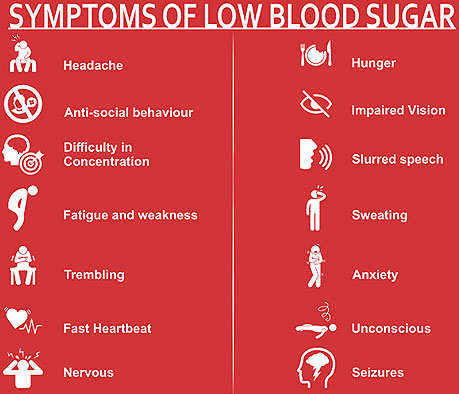When The Blood Sugar Goes Low, Here’s What To Do and What Not To Do
There are 2 major life-threatening conditions in a patient with regards to the blood sugar.
- Hypoglycemia (when the blood sugar is lesser than 70 mg/dl)
- Hyperglycemia (when the blood sugar is more than 200 mg/dl)
These 2 conditions can be detrimental if not recognized and treated early.
Hypoglycemic Episode:
It is defined as a syndrome which is associated commonly with blood sugar levels of less than 70 mg/dl.

It is classified into 3 types:
- Mild: CBG between 50-70 mg/dl + Neurogenic Symptoms
- Moderate: CBG between 50 – 70 mg/dl + Neuro-glycopenic Symptoms
- Severe: CBG < 50 mg/dl
What can cause it?
- Too little food or carbohydrates (poor oral intake)
- Skipped or delayed meals
- More active than usual
- Too much insulin or too many diabetic pills
- Infection
How does one recognize the signs and symptoms of hypoglycemia?
Depending on the blood glucose levels, patients can be asymptomatic or symptomatic with varying degrees of severity of signs & symptoms secondary to low blood glucose levels.

Patients with Mild Hypoglycemia present with the following symptoms:
- Palpitations / fast heart beat
- Tremors
- Sweating
- Anxiety
- Hunger
- Paraesthesia / numbness
Patients with Moderate Hypoglycemia present with the following symptoms:
- Behavioural Changes
- Confusion
- Altered Mentation
- Headache
- Nausea
- Extreme Sweating
- Irritability
- Dizzy / Giddiness
Patients with Severe Hypoglycemia present with the following symptoms:
- Severe confusion
- Lack of coordination
- Extreme fatigue
- Seizures / fits
- Impaired Vision
- Coma
- Unconsciousness
- Death
What to do when the blood sugar goes low?
- Check the CBG if a capillary blood glucose testing machine is available.
- If the patient is conscious and alert or talking and responding, yet symptomatic – Oral sugars (1-2 spoons of sugar mixed in 1 glass of milk or chocolate bar) can be given.
- If the Patient is semi-conscious or unconscious – Pl take the patient to the hospital for IV dextrose correction and observation.
What should not be done?
- Never Give Oral sugar water / ORS / water – to an unconscious or semi-conscious patient as one can aspirate these contents into the lungs causing further complications.
- Do not ignore assuming patient is sleeping.
- Do not delay to review with the Physician or Diabetologist.
Treatment of Hypoglycemic Episode:
- For mild symptomatic hypoglycemic episodes – oral sugars (1-2 spoons with 1 glass of milk or Chocolate bar) can be given.
- For Moderate and Severe Hypoglycemic Episodes – IV dextrose is suggested at hospital.
- Review of medications by the Physician or Diabetologist.
- Treatment of the cause:
- If the precipitating factor is an infection – treat with appropriate antibiotics
- If the precipitating factor is poor oral intake – improve nutrition
- Prevent recurrent attacks by close monitoring of blood sugar levels.

